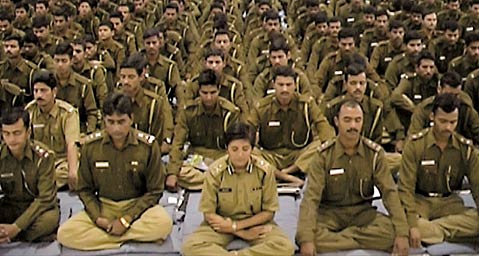SBIFF ’09: Whatcha Gonna Do When She Comes For You
Documentary Chronicles Life of Kiran Bedi, India's First Female Police Officer

With Slumdog Millionaire topping everyone’s must-see lists and the consistent influence of Bollywood on American cinema over the last few years, it is safe to say that India is quickly becoming a filmmaker’s goldmine. In the documentary Yes Madam, Sir, Australian filmmaker Megan Doneman portrays India from a new perspective. Narrated by Academy Award-winner Helen Mirren, Yes Madam, Sir documents the life of Kiran Bedi, India’s first – and now highest ranking – female police officer, considered by many to be the Gandhi of this era. The film, which will be the first documentary ever theatrically released in India, makes its American premiere at the Santa Barbara International Film Festival on Saturday, January 24.
Our first glimpse of Bedi is a clip from her early days on the force, chasing down a mob singlehandedly. It turns out the police officers assigned to keep the peace had run off in fear, leaving Bedi alone to contend with the riot. We then hear Bedi’s response to questions about the incident:
“Were you scared?”
“No.”
“Why not?”
“Because I am very focused.”
It was this kind of determination that pushed Bedi up the ranks of the Delhi police force, much to the chagrin of many of her colleagues and superiors. She began making some serious waves and was soon receiving attention from the press, both negative and positive.
Unfortunately for Bedi, her bold nature offended those in power. She towed the prime minister’s car, and arrested a lawyer, which is taboo in Indian culture. As a sort of smug retaliation, the government and law enforcement officials sent Bedi to take governship of Tihar, one of Asia’s most corrupt prisons. Tihar was just another challenge for Bedi, and she met it head on. She represented a force of justice and hope these prisoners (including children of imprisoned mothers) had never seen. She donated books, provided yoga, and hired educators to assist in the rehabilitation of the prisoners. She also began vipassana meditation as treatment: Prisoners would meditate 12 hours a day for 10 days in complete silence. Change came, and what was once considered a “human warehouse” became a place of genuine criminal rehabilitation. And this is only the first of Bedi’s triumphs.
Her passion for justice and peace takes her across India, as the persistent hand of her superiors forces her into situations that would likely break a less devoted officer. Along the way, Doneman is able to reveal the complex character that is Kiran Bedi. And it’s not all necessarily glowing – although an avid activist for human rights and social justice, Bedi is also a bit of a publicity junkie, often placing her work and notoriety above her family.
But Doneman’s documentary is inspiring to say the least. At the core, it really assesses the deepest faults of human nature. Bedi’s charisma and the characters that make up her life will no doubt provoke a smile or two. This is a film that really defines the extent of human capabilities, and the determination of the human spirit.



